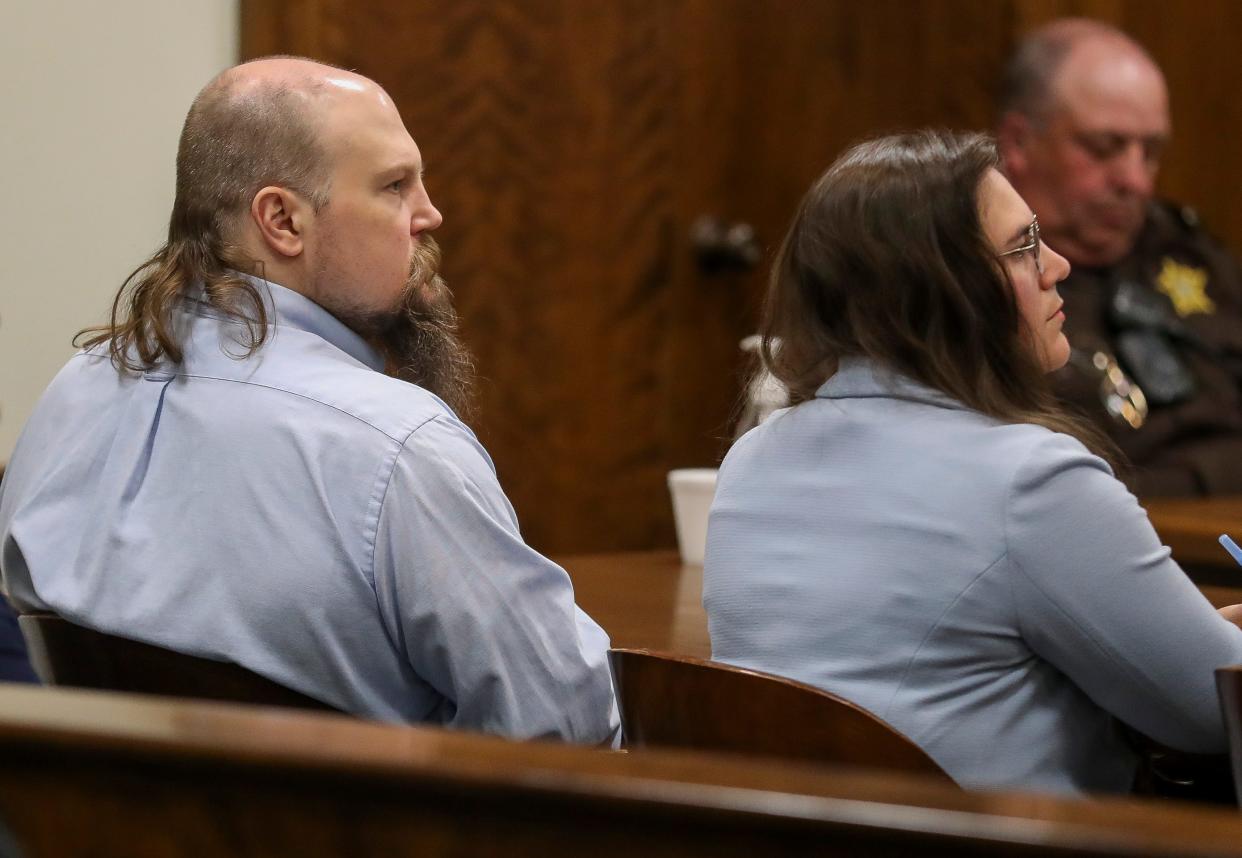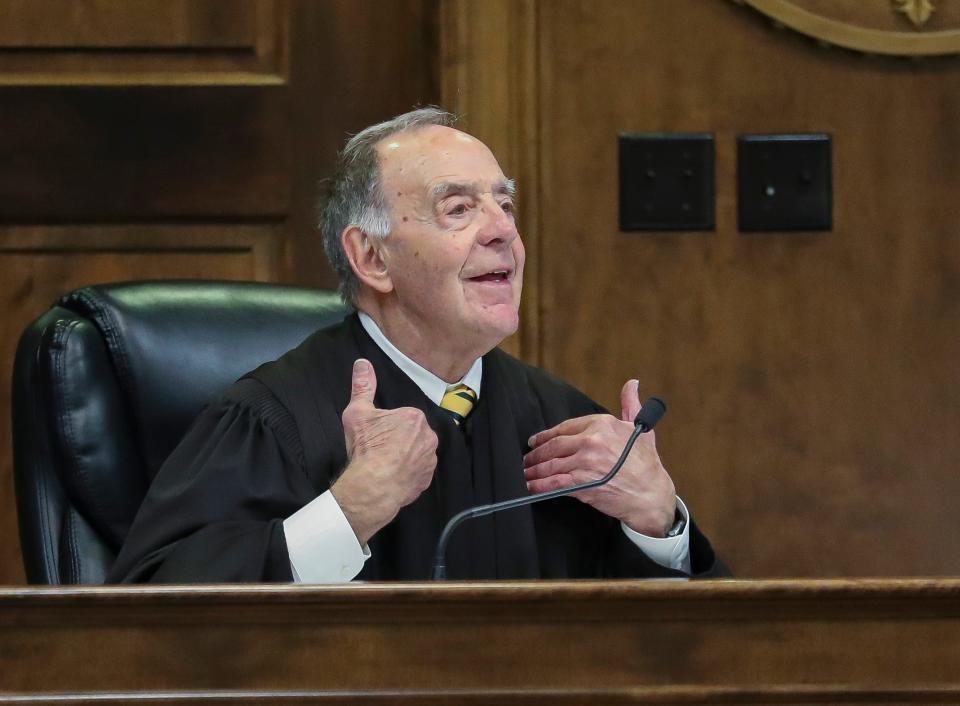Jury rejects insanity defense for man convicted of hate crime in stabbing death in Green Bay prison

GREEN BAY – A prisoner who killed a Black prisoner at Green Bay Correctional Institution in 2022 did not have a mental illness impacting his decisions, a jury decided Thursday.
It was the second verdict during a four-day trial. Joshua Scolman, 40, was convicted Tuesday of killing 25-year-old Timothy Nabors, Jr., and attempting to kill Lamonte Washington, 26, both as hate crimes, at Green Bay Correctional Institution in October 2022.
Because Scolman entered a plea of not guilty by reason of mental disease or defect — commonly referred to as an insanity plea — a second phase of the trial began Wednesday, to determine his criminal responsibility. Scolman’s attorneys argued he was not capable of either realizing the wrongfulness of his actions or conforming his conduct to the law.
The jury did not agree. They reached their verdict Thursday afternoon after around two hours of deliberating.
Scolman faces a mandatory sentence of life in prison. His sentencing hearing is scheduled for 1 p.m. Monday.
"Mr. Scolman is a racist. And Mr. Scolman is delusional."
At closing arguments Thursday morning, Scolman’s attorney Brianna Zawada encouraged the jury to look deeper beyond the “easy answer" that Scolman killed Nabors and tried to kill Washington solely because of racism. Zawada argued Scolman was experiencing psychotic delusions that made him believe he was being ordered by a higher power to kill certain people.
“Folks, Mr. Scolman is racist. And Mr. Scolman is delusional,” she said.
Brown County Deputy District Attorney Caleb Saunders argued in the prosecution’s closing argument that the only evidence supporting the idea that Scolman was delusional or psychotic came from Scolman reporting his symptoms and was therefore unreliable.
Saunders said Scolman was motivated by hatred and racism, and even if he was delusional, his actions and demeanor immediately before and the attack showed Scolman was capable of controlling his behavior.
He added that if Scolman were to be found not guilty due to mental disease or defect, it would be "a way for Mr. Scolman and others like him to be relieved of responsibility for their hate."
On Wednesday, the defense and prosecution each called a psychologist to provide expert testimony about their separate evaluations of Scolman and conclusions they drew from it. In their closing arguments, both the defense and prosecution claimed their psychologist was more credible than the other.
A hate crime at Green Bay Correctional Institution
Around 6:30 a.m. Oct. 21, 2022, while prisoners were let out of their cells for medication distribution, Scolman attacked two Black inmates on the stairwell from the first to second floors of Green Bay Correctional Institution’s South Cell Tower.
Scolman lunged at Nabors, stabbing him in the chest. He then chased Washington down the stairs and around the first floor, before correctional officers were able to subdue them with pepper spray.
Shortly after, prison staff realized Nabors had collapsed and was bleeding on the second tier.
Nabors was transported to HSHS St. Vincent Hospital, where he was pronounced brain dead six days later.
Washington received only minor injuries, and was treated at the prison.
Earlier in the trial, multiple prison staff testified to providing emergency medical care to Nabors, who was awake for a few minutes before losing consciousness and his pulse. They also testified to speaking with Scolman after the attack. Two guards said he swore and used the N-word.
The weapon Scolman dropped after being stopped by correctional officers was a handmade knife, which appeared to be constructed from a part of a metal bed frame. Its blade was 6 to 8 inches long, one correctional officer testified, and had a handle made of rubber and shoelaces.
The knife also included multiple carvings, including a swastika.
Evidence presented earlier in the week included a letter Scolman wrote to another inmate in December 2023 in which he described attacking Nabors and Washington simply because they were Black. The letter was filled with racial slurs against Black people and antisemitic language.
An investigation report from the Brown County Sheriff’s Office also stated that before the attack, the prison had been investigating Scolman for “extremely concerning racist activity” — including "numerous letters" Scolman wrote regarding attempts to become a member of a white supremacist prison gang, for which a condition to be accepted was "to kill a black male."

Psychologists give opinions on Scolman's mental state
Opening statements and all testimony for the second phase of the trial took place Wednesday.
Because the defense had the burden to prove Scolman was not guilty by reason of mental disease or defect — also known an NGI plea — the defense gave their opening statement before the prosecution. It’s the opposite of the criminal portion of the trial, where the defendant is innocent until proven guilty, and thus the prosecution has the burden to prove their guilt.
"This isn't about race entirely," Scolman's other defense attorney, Britteny Koenig, said in her opening statement. She said Scolman's "delusions took over and guided his actions on Oct. 21, 2022."
Saunders asked jurors to listen closely to the testimony from psychologists and people who interacted with Scolman the day he attacked Nabors and Washington.
"Many people in this community deal with mental illness on a daily basis. They're still responsible for what they do," he said.
The defense called just one witness to testify: Kevin Miller, a Green Bay-based psychologist who has done hundreds of NGI evaluations in the past, both ordered by the court and retained by defense attorneys. Miller met with Scolman a year after the incident to evaluate if he believed Scolman had a case to plead NGI.
For his evaluation, Miller also reviewed Department of Corrections records dating back to 2007, when Scolman was first sent to prison to serve a 51-year sentence for a drunken driving crash in Milwaukee that killed three people and seriously injured a fourth person.
Miller said in his opinion, Scolman has multiple mental health diagnoses, and that those diagnoses impacted his decision-making abilities on Oct. 27, 2022.
Two of those diagnoses Miller concluded were an "unspecified schizophrenia spectrum and other psychotic disorder" and an "unspecified personality disorder with schizotypal and antisocial features" — which had symptoms, Miller said, including having an "odd or unusual appearance" and "eccentric or weird" beliefs.
Miller said Scolman opened up about his delusions after becoming more comfortable speaking with Miller. The psychologist said Scolman told him he believes he is descended from Scandinavian gods who order him to kill people who are not descended from those gods. He said his “targets” are identified when he is unable to see a person’s facial features.
Miller testified that Scolman informed him that he saw many people as “faceless” — including Black people and those of non-white races, but also correctional officers and even his own attorneys.
Miller testified that he contacted Scolman's attorneys' law office, as well as the district attorney’s office and the Brown County Sheriff’s Office about concerns that Scolman may try to kill his attorneys or another person in court, if given the opportunity.
“I thought, either this guy’s faking it or this guy’s seriously mentally ill,” Miller said.
Miller told the jury he did not draw a conclusion right away after the meeting, and instead reviewed more documents from Scolman’s history and also sought a second opinion, before concluding that he did not believe Scolman was faking mental disorders.
When it was the prosecution’s turn to call witnesses, they also brought a psychologist. Their psychologist, Matthew Seipel, testified that he did not believe Scolman was in a state of psychosis on the day of the homicide, and should therefore be held criminally responsible.
Like Miller, Seipel also diagnosed Scolman with multiple disorders, including anxiety, depression and antisocial personality disorder. He did not, however, believe that Scolman had, as Miller had concluded, schizotypal personality disorder or a psychotic disorder.
“There were not observable indications that he was laboring with active psychosis,” Seipel said. There was also no indication in the Department of Corrections’ records about Scolman, dating back to 2007, that he had ever shown physical signs of psychosis, the psychologist testified.
Saunders pointed out that there was no mention of discussion of “faceless people” or Scandinavian gods in Scolman’s mental health records prior to the homicide.
Seipel additionally noted that Scolman had a "well-documented history of racial prejudice."
Other prosecution witnesses also testified Wednesday about Scolman’s demeanor the day of the crime:
A prison therapist who spoke with Scolman later in the morning after he attacked Nabors and Washington said he was unusually “cheerful, smiling, talkative” when they talked — moreso than she had ever seen him in the multiple visits they previously had.
A prison captain who rode next to Scolman as he was transported from Green Bay Correctional Institution to Wisconsin Secure Program Facility in Boscobel later in the day of the attack said Scolman’s demeanor the whole ride was calm, and they even discussed books and movies.
The prosecution played a video of a Green Bay Correctional Institution captain’s body camera while he spoke with Scolman hours after he stabbed Nabors. Scolman had a calm demeanor, even joking with the captain at one point that the correctional officer who pepper sprayed him “got (him) good.”
RELATED: 1 week before trial, hate crime charges added in Green Bay prison homicide case
Legal definition of mental disease or defect is narrow
The jury’s decision in the second part of the trial essentially determined if Scolman would be sentenced to life in prison for his crimes, or if he would receive a sentence involving treatment in a mental health institution.
To reach their verdict, Wisconsin law required the jury to consider two factors: the first, if Scolman had a mental disease or defect, as defined in state law, at the time of the crime. If they had said yes to that, they would have then needed to make a decision as to the second factor: whether that mental disease or defect caused Scolman to lack "substantial capacity to either to appreciate the wrongfulness of his or her conduct or conform his or her conduct to the requirements of law."
However, the jury concluded there was not enough evidence supporting the argument that Scolman had a mental disease or defect.
In jury instructions, Brown County Circuit Court Judge Donald Zuidmulder explained mental disease or defect "identifies a legal standard that may not exactly match" the definition described by medical professional.
The legal definition does not include a diagnosis that only has symptoms of "repeated criminal or otherwise antisocial conduct" — so antisocial personality disorder, attorneys explained, does not qualify. It also cannot be used as a defense for a "temporary frenzy or passion fueled by hate."
Contact Kelli Arseneau at 920-213-3721 or karseneau@gannett.com. Follow her on X, formerly Twitter, at @ArseneauKelli.
This article originally appeared on Appleton Post-Crescent: Jury rejects insanity plea for hate crime homicide in Green Bay prison

